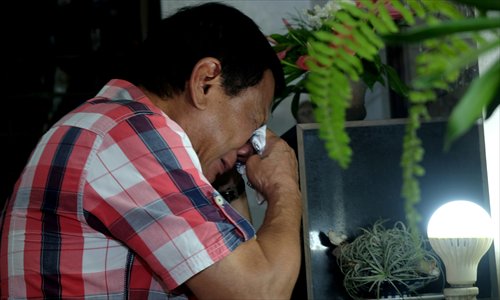Duterte’s sea policy takes center stage
China hopes new govt can improve ties

Presidential candidate and Davao Mayor Rodrigo Duterte cries as he visits the tomb of his late father Governor Vicente Duterte at San Pedro Memorial Park in Davao City, on the southern Philippine island of Mindanao on Tuesday. Duterte vowed on Tuesday a relentless crackdown on crime after securing a landslide presidential victory. Photo: AFP
As Rodrigo Duterte moves closer to becoming the Philippines' next president, analysts speculated on how different his policy will be on the South China Sea issue than his predecessor's.
Duterte's win in Monday's elections remains unconfirmed, but an unofficial count of votes by an election commission-accredited watchdog shows that with almost 39 percent of votes cast, Duterte had a huge lead over his two closest rivals, both of whom have conceded defeat, Reuters reported Tuesday.
"China hopes the Philippines' new government can work in the same direction with China, properly handle our differences and get bilateral ties back on track with concrete actions," Lu Kang, China's foreign ministry spokesperson, said at a press briefing on Tuesday, in response to Duterte's win.
In an early indication of his unorthodoxy, Duterte told reporters on Monday that if he becomes president he would seek multilateral talks to resolve disputes over the South China Sea, adding that negotiations should include Japan, Australia and the US.
"Duterte understands that the disputes over the South China Sea are actually a competition between China and the US, so the Philippines should better keep away from it, since the country has no means or capital to get involved," Li Kaisheng, a research fellow at the Shanghai Academy of Social Sciences, told the Global Times.
"Aquino's policy of seeking to contain China has plunged relations between the two countries to its lowest in history, so when Duterte becomes president, relations could only improve," Chen Xiangmiao, a research fellow at the National Institute for the South China Sea, told the Global Times.
"However, the improvements would focus mainly on the economy instead of the Philippines' South China Sea stance, because the current policies, including the arbitration and the military cooperation with the US, will make it very difficult for big changes to happen," Chen said.
Duterte, 71, the Davao City mayor, announced plans on Tuesday for an overhaul of the country's system of government that would devolve power from "imperial Manila" to long-neglected provinces, Reuters reported.
"It's with humility, extreme humility, that I accept this, the mandate of the people," Duterte said in Davao early on Tuesday morning as the results came in, the AFP reported on Tuesday.
Besides Duterte's attitude on China and the South China Sea, Philippine political stability is also an issue that would affect Duterte's future policies.
According to the unofficial count as of 4 pm of May 10, the vice presidency would go to Leni Robredo from the Liberal Party, a powerful party and Duterte's political rival, Li said.
"If the political struggle worsens, if he faces the risk of an impeachment, Duterte's policies, including the ones on China, would differ from what he has stated," Li said.
Many factors
Chito Sta. Romana, president of the Philippine Association for Chinese Studies, said Duterte speaks the "language of the streets," which is an effective way to communicate to the common people. He also focuses on law and order and cracks down on crime, which is also an attractive element for the public.
In terms of China's relationship with the Philippines after he becomes president, Romana thinks Duterte will move toward the direction of improving relations, but it's difficult to predict at this moment what will happen, as there are many factors involved, such as the results of the US elections, the result of the South China Sea arbitration and China's attitude.
"What he will likely do is maintain the friendship with the US, as well as develop friendly ties with China, instead of forming an anti-China coalition with the US," Romana said. "It's going to be a test of how he deals with it."
Voters in Manila reacted differently to Duterte's win.
Marcos, a Manila resident, said he thinks Duterte will be a good president. He wore a bracelet with Duterte's name on his right wrist and said he has attended Duterte's rallies.
A taxi driver who supports Grace Poe said he is not happy with the result. He thinks Duterte is all about acting tough and using strong words, which is why he won a lot of support, but he is too extreme and a dangerous man.
"He's kind of like Saddam Hussein, you know?" he said.